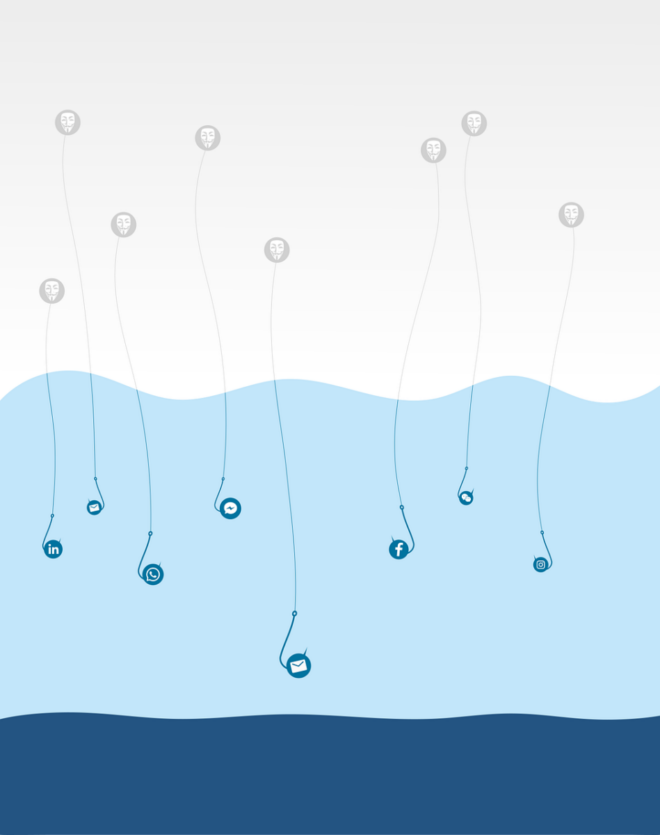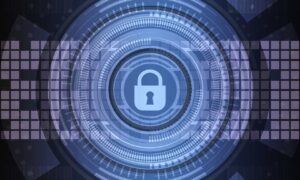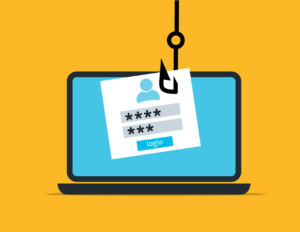Smart Phishing Emails: If You Take the Bait, it’s Too Late!

Bolder and smarter describe today’s email hackers. One of the most common and dangerous tactics they use is phishing, and it’s only becoming harder to detect.
No longer do we see the obvious scam emails full of spelling mistakes and bad grammar. The scam artists have learned and are now carefully crafting messages that appear to come from trusted sources—sometimes even using real email addresses that have been compromised.
We work in an ever more connected world and a single click on a bad link can lead to email account takeovers, ransomware attacks, and data breaches that can cease business operations. It’s critical for organizations of all sizes to stay a step ahead of the growing threats.
Let’s delve into what you need to know about the latest phishing email tactics and how you and your team can avoid being victimized.
Phishing Attacks are Deceptive and Dangerous!
Phishing emails have become so cleverly deceptive that even savvy users are being fooled. Here’s why:
- Real email addresses: Hackers can gain access to legitimate email accounts and send messages from trusted names in your company or partner organizations.
- Authentic-looking content: Modern phishing emails often use the right logos, language, and formatting to appear completely legitimate.
- Sense of urgency: Many attacks pressure users to act fast—such as updating a password, paying a fake invoice, or confirming login details.
- Precisely targeted: Some attacks are customized with personal or company-specific details to make them look legitimate or even important. This is called “spear-phishing.”
The Dreaded Consequences of Email Takeover
Skilled attackers can gain access to a business email account. When that happens the results can be disastrous as they can:
- Send fraudulent emails to customers or colleagues in your name
- Gain access to sensitive data or intellectual property
- Trick employees into giving login credentials or even transferring funds
- Spread dangerous malware such as ransomeware throughout the organization
 All that can be just the beginning of the problems. Reputational damage, legal liabilities, and compliance violations can follow a successful phishing attack.
All that can be just the beginning of the problems. Reputational damage, legal liabilities, and compliance violations can follow a successful phishing attack.
Best Practices to Protect Against Phishing Attacks
Employee and partner education is where it starts. Applying vigilance with consistency is your first line of defense. CCI recommends the following:
1. Be suspicious of unexpected email. If something feels off (tone, timing, or request), verify it with the sender via another communication method before taking action.
2. Inspect email addresses carefully. Whenever in question, check the full email address for slight variations or misspellings.
3. Hover before you click. Always hover your mouse over links to see the true URL. If it doesn’t match the sender or expected destination, don’t click it.
4. Don’t download unknown attachments. Malicious files can install malware and spread across your network.
 5. Use multi-factor authentication (MFA). Even if a hacker gets your password, MFA can usually stop them from accessing your accounts.**
5. Use multi-factor authentication (MFA). Even if a hacker gets your password, MFA can usually stop them from accessing your accounts.**
6. Keep software and systems up to date. Patches and updates often contain important security fixes. Delaying them increases risk.
7. Train your team often. Cybersecurity is a shared responsibility. Run frequent awareness training sessions and simulated phishing tests.
**Unfortunately, MFA is no longer a completely reliable shield from a breach. Hackers have found new and creative ways to steal MFA codes – which then gets them in permanently and can go undetected. This is why our programs such as Endpoint Detection & Response (EDR) and IDTR (Identity Threat DeTection & Response) go beyond traditional antivirus protection. Clients are immediately notified if an unidentified entity or intruder has logged into their account, and we can take immediate protective action.
Get Help Fortifying Your Email Security
 CCI Managed Services helps to more fully protect businesses against the evolving cyber threats. For example, if every single team member uses business premium licensing from Microsoft we can set policies to automatically deny any sign-in attempt outside of a specifically designated geographical area.
CCI Managed Services helps to more fully protect businesses against the evolving cyber threats. For example, if every single team member uses business premium licensing from Microsoft we can set policies to automatically deny any sign-in attempt outside of a specifically designated geographical area.
The hackers are smart. We need to do better than just match wits. We need to proactively understand their moves and keep a defensive step ahead! From advanced threat detection to managed email security and end user security training, your friendly CCI team offers cybersecurity solutions to keep your team and data safe from the hackers.
If you’re concerned about your organization’s vulnerability to phishing or email-based attacks, we’re happy to schedule a free sales consultation without any obligation. Click here to learn more, and don’t worry, this link is safe!


